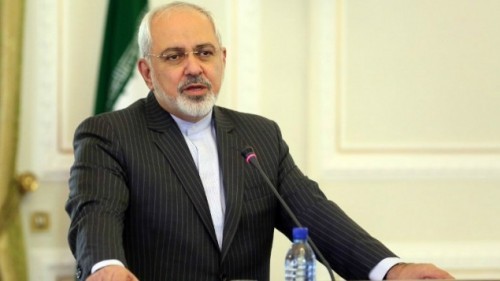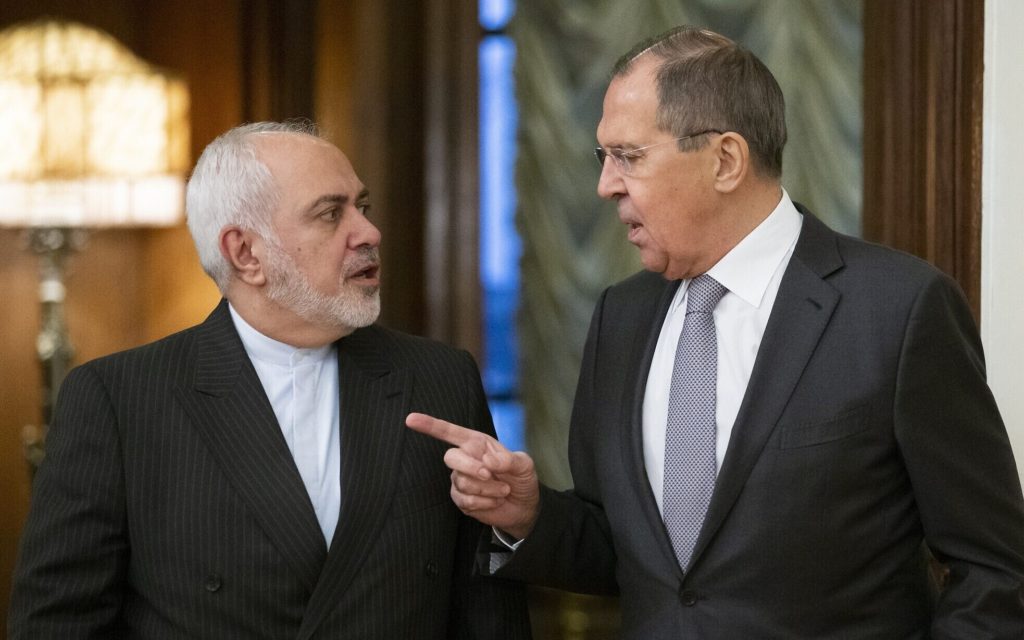
By Kasra Naji
A leaked audio tape in which Iran’s Foreign Minister, Mohammad Javad Zarif, bemoans that the Revolutionary Guards dominate the country’s foreign policy and took it into Syria’s civil war at the behest of Russia is making the rounds, with many on social media expressing shock and bewilderment.
Some of the revelations confirm what many Iranians have suspected all along. What is surprising is that they came from Mr Zarif, an experienced diplomat who is normally very guarded and is a moderate by Iranian standards.
It is not clear who has leaked the tape, though it comes as Iran prepares to hold a presidential election and internal power struggles reach new heights. Mr Zarif has said he is not a candidate to succeed President Hassan Rouhani, but hardliners do not trust him and want to eliminate any chance of that happening.
What is clear is that the tape will land Iran’s top diplomat in big trouble with hardliners and the Supreme Leader, Ayatollah Ali Khamenei, who has the final say over all government matters and controls the Revolutionary Guards, the country’s most powerful security force.
One newspaper has already described the story as a “scandal”.
It appears that the three-hour audio tape, which has reached the BBC and other news outlets abroad, is taken from a video of a seven-hour interview that was conducted more than two months ago as part of an oral history project covering President Rouhani’s two terms in office.
In the tape, Mr Zarif is twice heard saying he believes that his comments will not be heard or published for many years.
The minister repeatedly complains that the Revolutionary Guards have made diplomacy and Iran’s foreign policy subservient to their battlefield needs in the region.
He specifically mentions how General Qasem Soleimani – the former commander of the Revolutionary Guards’ Quds Force, who was killed in a US drone strike in Iraq in January 2020 – often went to see him with requirements.
He recalls how Soleimani wanted him to take particular positions in meetings with the Russian foreign minister, and says the general effectively took Iran into the war in Syria because Russian President Vladimir Putin wanted Iranian forces on the ground to complement the Russian air campaign in support of the Syrian government.
He also complains that Soleimani used Iran’s national carrier, Iran Air, for military flights to Syria at great risk and reputational cost to the country, confirming reports that civilian aircraft were used for gun-running and troop transportation.
Our Administration’s exquisite strike on Qasem Soleimani had a massive impact on Iran and the Middle East. You don’t have to take my word for it. Ask @JZarif. President Biden still thinks it was a mistake. #AmericaFirst #AbrahamAccords https://t.co/NmbETQx05B
— Mike Pompeo (@mikepompeo) April 26, 2021
The BBC is not responsible for the content of external sites.
Mr Zarif also says Russian Foreign Minister Sergei Lavrov did everything he could to stop Iran from agreeing to a nuclear deal with six world powers – including Russia – in 2015. He alleges that Russia never wanted to see Iran mend fences with the West.

His words are surprising, as it is generally understood that he has good relations with Mr Lavrov and that Russia is a close ally of Iran. The leak also comes at a time when Iran is engaged in indirect talks with the US in Vienna with the aim of reviving the nuclear deal, which has been close to collapse since then President Donald Trump reinstated sanctions in 2018 and Iran began breaching its commitments in response.
Mr Zarif says the Revolutionary Guards never wanted the agreement and did everything they could to stop it. He mentions the testing of a missile on which they had written “Israel should be wiped off the Earth” in Hebrew and the detention of 10 US sailors on board two patrol boats in the Gulf in early 2016 as examples of their efforts to scupper the deal.
Mr Zarif complains that the Revolutionary Guards sidelined him on many occasions.
He mentions the early hours of 8 January 2020, when Iran attacked an Iraqi military base housing US forces with more than a dozen ballistic missiles in retaliation for the killing of Qasem Soleimani. He says he only found out about the missile attack two hours after it happened.
Later that day, he adds, when a Revolutionary Guards air defence unit shot down, apparently by mistake, a Ukrainian passenger airliner that had just taken off from Tehran, killing all 176 people on board, commanders only wanted him to deny Iranian culpability.
The Iranian foreign ministry’s spokesman has said Mr Zarif’s comments in the audio tape have been taken out of context and that, if necessary, it will publish the whole interview.
According to the spokesman, the foreign ministry does not have the recording in its possession and that its safekeeping is not the ministry’s responsibility.
BBC

Leave a Reply
You must be logged in to post a comment.